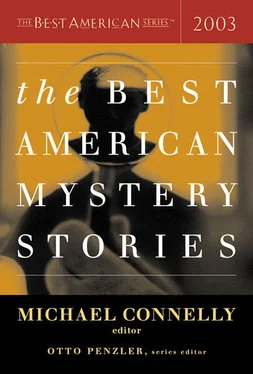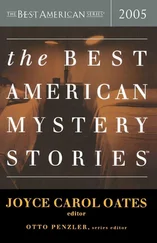“So?” the kid said.
Right away, he saw for himself what the old man meant.
“We put the five thousand up front, right? I told your people, you’re late, you forfeit the back end. That simple.”
Whittemore looked from one of them to the other. Identical, but he could already tell who was who.
“No comprendé?” the kid said.
He began to tell them that the back end didn’t matter, that he hadn’t done it anyway, but he stopped himself, waiting to see where this would go. “The deal was ten,” he said. “Five in front, five after it’s done. That was the agreement.”
The kid shook his head, and then he and his brother glanced at each other again. “It’s like I told your people. Time constraints have been violated. The agreement’s changed.”
Whittemore sat dead still, looking from one of the twins to the other.
“I know what you’re thinking,” the kid said. “I know everything you’re thinking, and it’s like I told your people, my brother and I have left instructions with our lawyers, sealed instructions to be opened in the event anything unfortunate happens. That occurs, the lawyers open an envelope, which spells out all the details of the whole situation. Names, dates, times, everything. If we so much as slip in the shower.”
They waited for him a moment, then smiled as the message settled. One of them, then the other.
“You two shower together?”
“Just a hypothesis, something to consider,” the kid said.
Whittemore considered their jewelry: Rolex watches half an inch thick, diamond rings, gold bracelets and neck chains. The one at the bookcase was wearing cuff links. He wondered if it was part of the jewelry business that you had to look like a Gypsy coming out a hotel window, or if these two just liked to twinkle when they moved, separate themselves from the world at large.
The kid in the chair looked at his brother, who had walked over to the window. The little glances reminded him of the way lovers reach out to touch hands without even knowing they’re doing it. “I mean, look at yourself,” the one in the chair said, “coming in here like this...”
Whittemore nodded at him, but the kid misunderstood. But then, he misunderstood everything. “It’s a Mexican standoff, man,” he said. “Now get your ass out of here before I call the police.”
He shot the one at the window first and then turned slowly to the one who did the talking, giving him a moment to reflect on his Mexican standoff.
Afterward, he stayed in the room a little longer than he should have, the cordite stinging his nose, studying the posture of the bodies, down to the exact position of the fingers when everything had stopped moving. He sat down behind the desk in the kid’s chair, taking the weight off his knees.
The one at the window had been a nail biter.
He thought of the old man and wondered how long it would be before he got homesick and showed up at the restaurant. His hands had shaken, but that was all. No crying, no regrets. There in the front seat, Whittemore had suddenly remembered how he’d let the guys who laughed at everything position his legs across the kitchen chairs just so and that one of his knees — he wasn’t sure even then which one — hadn’t dislocated the first time they came down on it, or the second, or the third.
He’d taken Eisner to a bus stop anyway.
Eisner got out and was around the car at Whittemore’s window in what seemed like the same instant, tapping at the window, brimming tears, and Whittemore rolled it down to see what he wanted, and he came in like death itself, glistening tears and snot, right through the window, his hands, his head, his shoulders, and shit the sheets if Whittemore didn’t just sit there and let the old man hug him.
Tyler Dilts
Thug: Signification and the (De) Construction of Self
From Puerto del Sol
I thug.
That’s not a grammatical error. I fully intended to use the word “thug” as a verb. I realize, of course, that for you, unless you happen to have some knowledge of hip-hop music and culture or hard-boiled noir fiction, you’re probably not familiar with this particular usage. But as I said, I actually meant to use the word “thug” as a verb, rather than in its much more common and familiar usage as a noun. The reasons for this are twofold:
1) I have, of late, been giving a great deal of thought as to how we define both ourselves and each other by what we do. [1] I use the first person plural here to refer to not only the personal “we,” but also to the culture at large.
I am fascinated by the subtle yet significant differences between the phrases “I thug” and “I am a thug.” The play in signification here seems never to exhaust its ability to keep my intellect bouncing back and forth, questioning the point at which I cease to be the sum of my actions and become the thing itself (i.e., at what point do I cease thugging and simply become thug?).
2) I find this type of nontraditional and playful usage of language to be quite stimulating and more than a little amusing. And I have always imagined it to be exactly the type of intellectual exercise with which my friends and I would ceaselessly amuse ourselves, over postmeal cocktails and cappuccinos at, say, Mum’s or Cha Cha Cha, had I, of course, any friends.
At any rate, I thug. And indeed it follows then that I must, to myself at least, pose the following question — since I do thug, am I then a thug?
Rather than attempting to answer that question presently, though, [2] An effort at which, I’ll readily concede, I have failed on several past occasions.
I reach in front of me to the coffee table, pick up both the television remote control and the current issue of the TV Guide on top of which it rests. The Guide has been conveniently left open to the proper day but not the proper time, so I find myself flipping past pages of upcoming television “events” to reach the four p.m. listings. [3] I know they simply must be considered “events” because in at least three of the ads they were identified variously as events of the “special,” “important,” and “not-to-be-missed” variety.
Not often having the inclination to watch television in the late afternoon, and curious as to with what I might be able to divert my attention, I find myself pleasantly surprised to see that, in addition to its regular eleven p.m. broadcast, the Charlie Rose show is now shown at four in the afternoon. I turn on the 36-inch Mitsubishi to channel 28, anxious to see whom Mr. Rose will be interviewing. [4] Charlie Rose is, of course, simply the finest interviewer currently working in television; next to him, Barbara Walters’s true gossipmonger colors can be seen in all their vivid brightness. Some might argue that Ted Koppel matches Rose’s skill, and while this may certainly be true insofar as simple technique is concerned, the broader scope of Rose’s interviewees and his encyclopedic knowledge in so many diverse areas clearly give him the edge. I won’t even deign to mention Larry King and his all-consuming celebrity nasal/anal interface.
No sooner do I realize that a group of well-known journalists are discussing the ethical ramifications of the recent media coverage of a number of national news events [5] I realize, of course, the oxymoronic possibilities of the phrases “ethical ramifications” and “media coverage” being used in the same sentence; that is, in fact, the irony I was looking forward to seeing examined on the program.
than I hear the unmistakable dull grinding of the garage door opener as it echoes through the kitchen. I turn off the television, slink into the kitchen, and take a position with my back flat against the wall next to the door leading into the garage. [6] Surprisingly, for a man of my considerable size and bulk — I stand six-foot-five and weigh 282 pounds — I slink surprisingly well. The skill is something of a requirement for any kind of long-ranging success in the thugging field.
I hear Bobby’s keys jangling for a moment, and then a click as the door is unlocked. The door opens, concealing me from his peripheral vision as he steps into the room. I slam the door forcefully behind him.
Читать дальше












